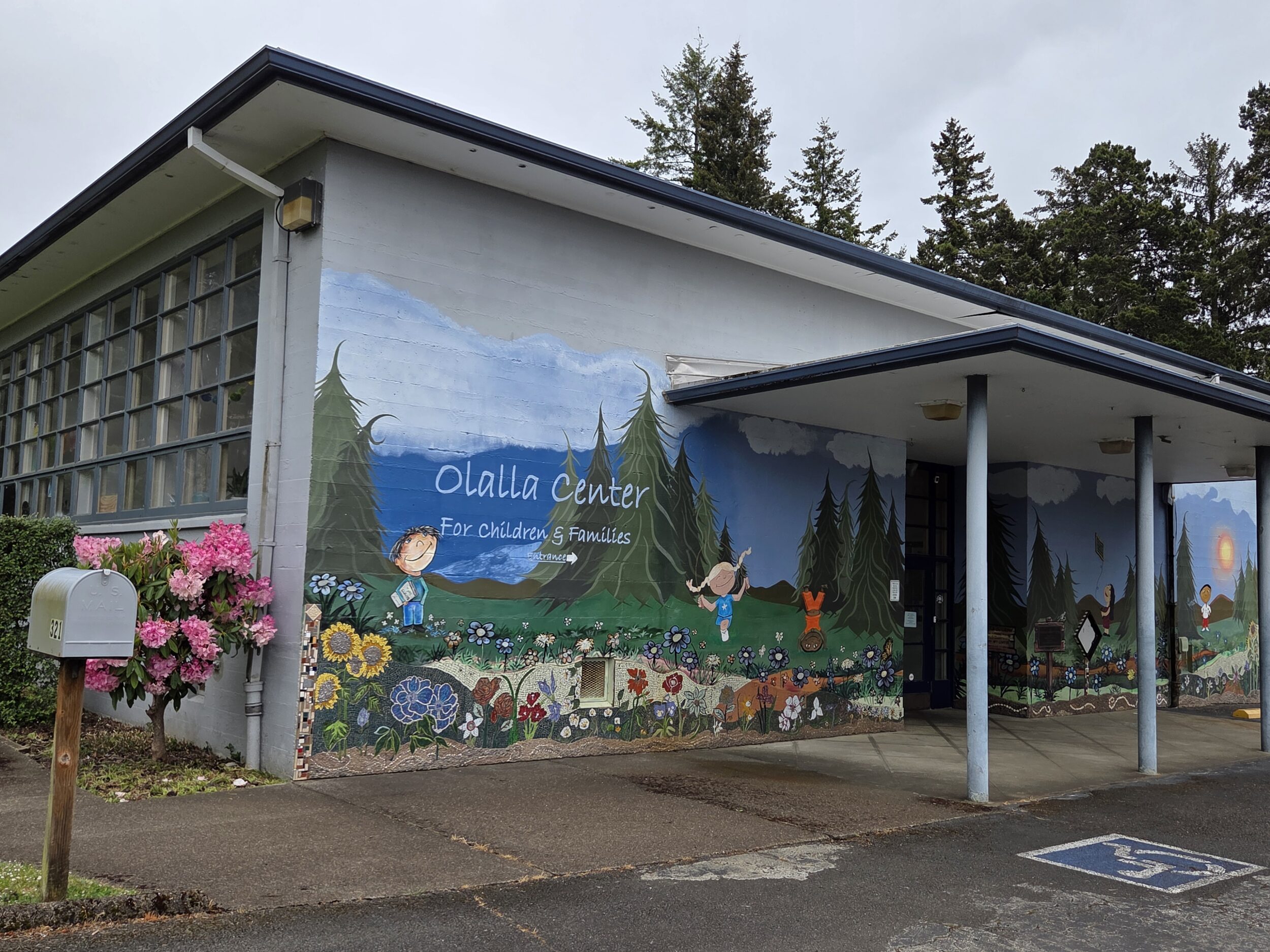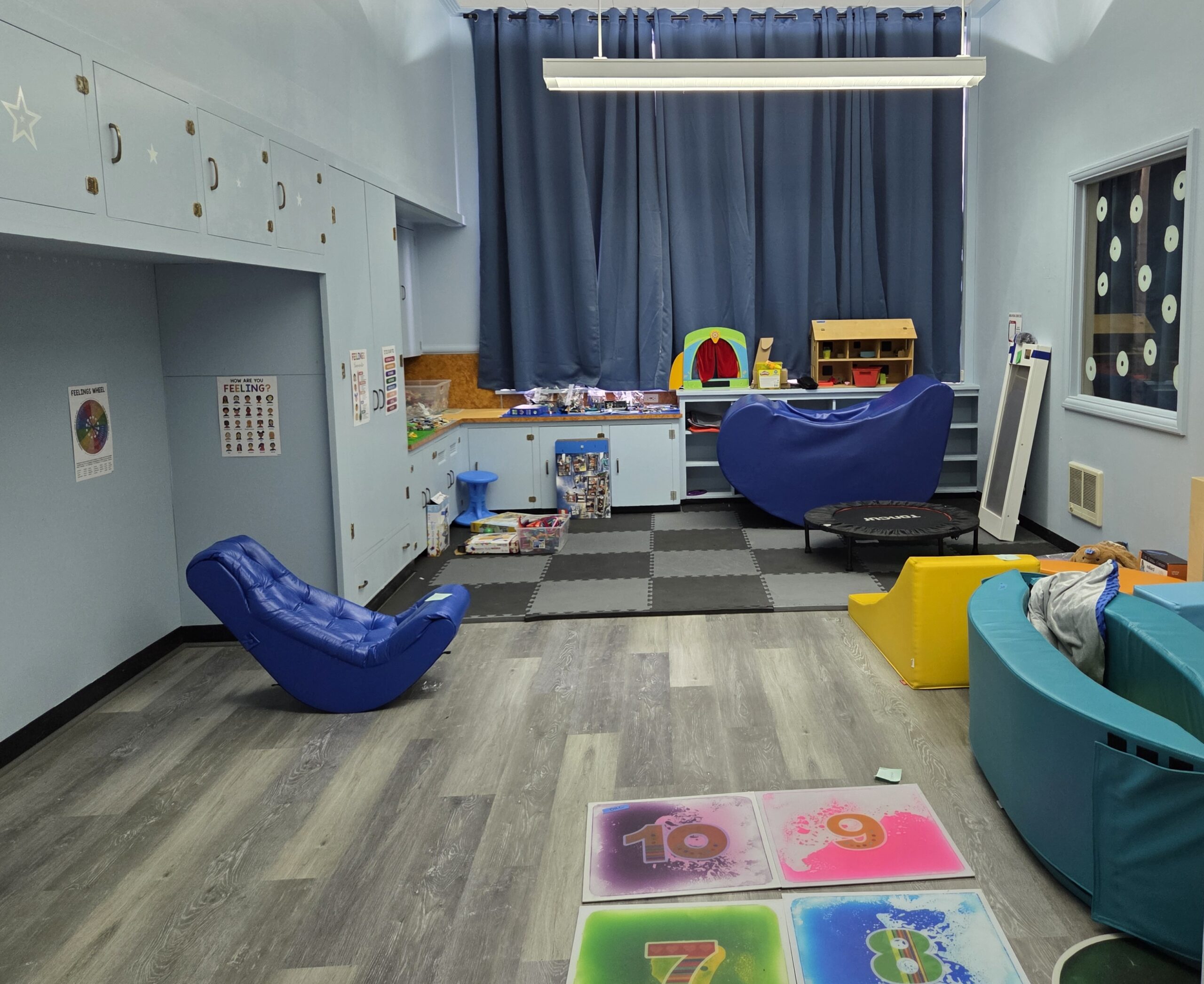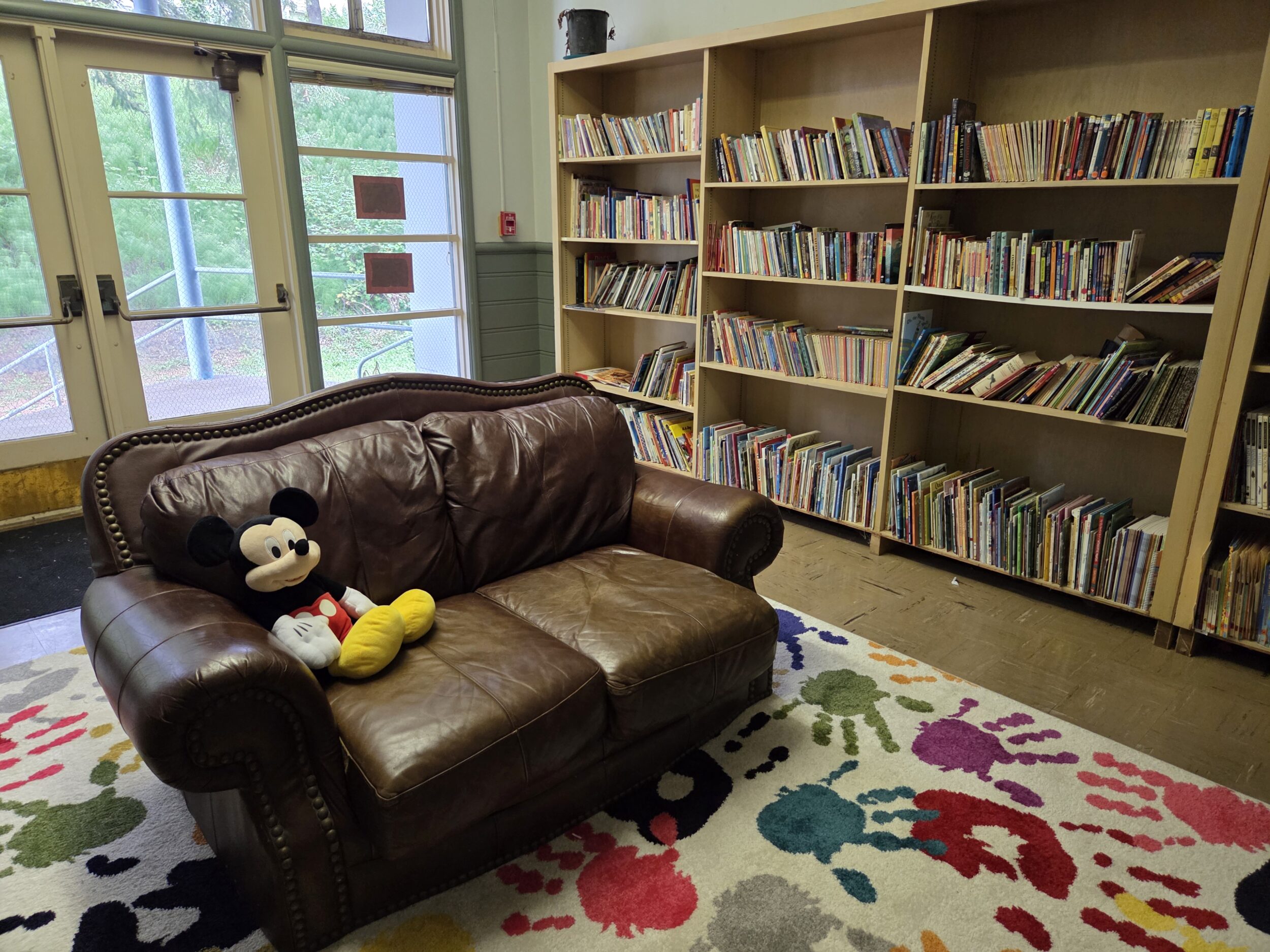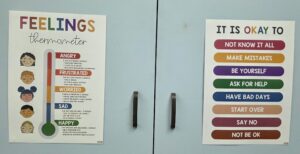
By SHAYLA ESCUDERO/Lincoln Chronicle
TOLEDO – A 47-year-old therapy-based school and resource hub — the only one of its kind in Lincoln County — has ceased operations after a failed merger agreement and years of financial instability.
Olalla Center, a day treatment program in Toledo, offered therapy-based education for children with disabilities and behaviors who need extra support before enrolling in public school. In recent years, the nonprofit has expanded to offer other community services, but had a recurring deficit – including one this year of $130,000.
After attempts to merge with another mental health provider fell through, the organization quietly buttoned up operations Tuesday.

Inside the Olalla Center, colorful pieces of paper cling to the windows like stained glass and children’s art fills the walls – finger paintings, paper chain octopus tentacles and tissue paper leaves. Lush greenery is visible from towering windows in nearly every room of the 20,000 square foot building that once housed Mary Harrison School.
Posters are sprinkled throughout the rooms – rules written in thick marker in the lunchroom, a “feelings thermometer” inside the group therapy room, and a coping skills chart in the sensory room.
Just days before the organization closed its doors, a classroom once filled with children’s artwork and decorations was mostly packed up – a rolled rug and several large boxes sat by the door. Therapists and behavioral health workers had deconstructed their offices too – children’s toys and personal items askew.
The Olalla Center became a licensed therapeutic school in 1978. The goal was to give children between the ages of 6 and 13 who needed a more supportive environment, a place to learn with integrated therapy so that they had the tools to succeed in public school. Overseen by a licensed child psychiatrist, the program combined education with group and individual therapy as well as special education.
Through its four-decade run, the organization expanded offering outpatient therapy and other programs including equine therapy, a Latino cultural center and community resources for LGBTQ+ youth.
Olalla’s estimated 70 patients were notified 1-2 weeks before it was closing. Those who sought outpatient services are in the referral process so that they can keep their same therapist and the six children still enrolled in day treatment are working with Lincoln County Behavioral Health to determine next steps, said executive director Lori Vallelunga.
While the organization held its last class Friday and officially ceased operations Tuesday, some of its programs will continue independently under their own nonprofit status. But the closest inpatient day treatment center is now in Corvallis — more than 40 miles away.
“We are the only day treatment, there are no other options in Lincoln County,” said Vallelunga.

What happened?
The majority of the nonprofit’s revenue comes from Medicare reimbursements – which have been declining for years and are under the threat of more cuts by the Trump Administration.
Financially, the nonprofit has been on shaky ground for a long time.
“It’s like Olalla was living paycheck to paycheck,” Vallelunga said.
This year, the organization’s $2.4 million budget had a deficit of about $130,000, and has run a similarly-sized shortfall the past couple years, Vallelunga said. In 2022, the organization had a $82,000 deficit, according to its federal tax filings.
For the past nine months the organization has been in talks of potentially having to cease operations or find a sustainable financial solution.
Two of the organization’s programs – Bright Horizons Therapeutic Riding, an equine therapy program and Arcoíris Cultural, a cultural center that focuses on supporting underserved Latino, Guatemalan and Indigenous Mesoamerican community members – obtained their own nonprofit status.
Because Olalla Center is the only day treatment center in Lincoln County, it hoped to merge with a nonprofit mental health provider.
“We got close,” Vallelunga said. “But it fell through at the end of April.”
The two parties signed a nondisclosure agreement, so Vallelunga wasn’t able to name the nonprofit. After the merger fell through, the organization’s board of directors voted to cease operations effective Tuesday.
The building is in escrow, with a pending $30,000 sale to another nonprofit. The Arc of Lincoln County, an organization that supports adults with disabilities, has rented space at the Olalla center for two years to house a program for people with intellectual and developmental disabilities to build social and interpersonal skills.
This summer, the organization has plans to add a new service that aids those with intellectual disabilities in getting jobs, said executive director, Nikki Holland.
“Owning the building will allow us to expand to offer other programming to people of all ages in the future,” Holland said. “We also plan to offer classes, training, and activities outside of our day support and employment services for people of all ages.”

Closing down
Olalla Center was part of the reason why Autumn Kramer and her family moved from the Columbia River Gorge to Toledo eight years ago.
At the time, her 8-year-old child, who has autism and PTSD, was being edged out of placements, struggling to access regular instruction in public school and would have to ride a bus for 40 minutes to get the closest day treatment program, Kramer said.
At Olalla Center, a teacher contracted through Lincoln County School District gave regular instruction and therapy is integrated throughout the day. The group was small, with usually about eight students in the classroom.

“They gave my kid the skills they needed to cope,” Kramer said. Now her child, who is 17 years old, is in public school and self-regulates better than most adults, Kramer said with a laugh.
Kramer’s family has also received equine therapy and she has had outpatient therapy services.
“They couldn’t reduce trauma in our lives, but they reduced the impact,” Kramer said.
One of Kramer’s children also participated in Project Bravery, an LGBTQ+ resource which will also cease operations with Olalla’s closure.
Project Bravery began in 2020 with pandemic funding, said program manager Robb Davis. With an office in downtown Newport, it aimed to build community for LGBTQ+ youth – it was a place for kids to make friendships and feel safe.
When Davis took the position of program manager, he knew the position was only funded until June. While other programs received their nonprofit status, Davis said that it wasn’t feasible for Project Bravery at the time.
So, for the past couple weeks he has emailed community partners to let them know of the program’s closure. Davis, who helps run Newport Pride, wants community partners to know he is still there as a resource and advocate to the LGBTQ+ community.
He also announced the closure of the Olalla Center and Project Bravery on the program’s Facebook – the only public announcement of the nonprofit’s closure.
While the Olalla Center’s operations are ending, the nonprofit itself won’t be dissolved yet. There’s a hope that it could be brought back someday but with the financial landscape now, it feels unlikely, Vallelunga said.
The next closest treatment center is Old Mill Center in Corvallis. Even then, the organization focuses on a younger age group of 4- to 6-year-olds while Olalla Center allows 6- to 13-year-olds to participate.
“I’m worried about how many kids won’t get intervention, ” Kramer said, “That crises won’t be addressed.”
- Shayla Escudero covers Lincoln County government, education, Newport, housing and social services for Lincoln Chronicle and can be reached at Shayla@LincolnChronicle.org





















There will be a large one-day sale at the Toledo campus in late June. Tons of books, puzzles, games and toys. There will also be a large amount of furniture, electronics, tables, chairs and business equipment. Date will be determined soon and announced.
Although none of my children needed Olalla Center’s help, I am grateful for the assistance they gave the children who did. I am so very sad to see this organization close as it is so very needed here in Lincoln County. I am hoping they will find another facility and re-open with no issues of funding. Our children are our future and they should get all assistance needed to navigate this tough world.